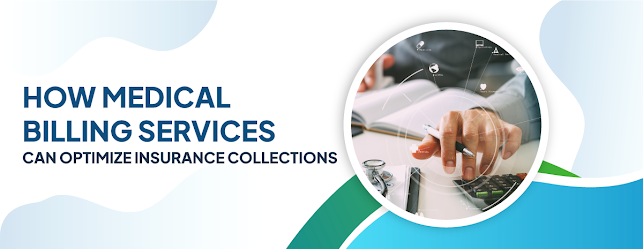How Medical Billing Services Can Optimize Insurance Collections
These days, the healthcare landscape is ever-changing. This implies that coders and billers must constantly update their skills so as not to leave any money on the table. When EMR and advanced management software were introduced, the general belief was that the standards of billing and collection would be raised. It was thought that this would result in greater accuracy and timely collections. However, sadly, this has not been the case. Some industry reports mention that independent medical practices are leaving as much as 30% of potential revenue on the table due to inefficient medical billing services and related collection processes.
Unfortunately, the rejection and denial rates are still too high. Almost 50% of the denials never succeed, which results in a 5-7% loss of potential revenue. Too many denials can get your revenue locked in Accounts Receivable. This can seriously affect your cash flow. Therefore, optimizing your medical billing and collection processes is advisable to maximize your revenue and avoid cash flow issues. With some of the tips mentioned below, you could easily see a revenue growth of 25-30%.
1. Code Correctly: For optimized healthcare revenue cycle management (RCM), it is essential that your medical coding is accurate. This is not just mandatory from a compliance perspective. This goes a long way in reducing claim rejections and denials. At the same time, this ensures the best possible reimbursements for the service. Several reports suggest submitting and reworking denials costs around $8-10 per claim. Hence, using 100% certified medical billers for coding is advisable to reduce coding and billing errors. Non-specific diagnosis codes are also responsible for coding errors as ICD requirements for diagnosis documentation are much more detailed than the ICD 9 requirements previously. Also, issues such as usage of incorrect modifiers, incorrect payer-specific guidelines, under-coding, and upcoding are other issues faced in the coding process. Also, it is advisable to have a reliable charge reconciliation process in place to ensure zero leakage effectively.
2. Always Submit Clean Claims: Much time and money is spent unnecessarily on resubmitting claims. The higher number of rejections also leads to higher costs. Hence, you need to make sure you submit clean claims for the first time. Although much about clean claim submission has been discussed, the industry average of claims First Pass Acceptance (FPA) is only between 79-85%. Whereas the minimum FPA you should seek is 97% or above. Clean claims mean reimbursements are faster and collections are optimized. A competent medical billing service provider will help you achieve your goals substantially and help you make significant savings annually per provider for reworking claims. You, too, can experience fewer days in AR as your FPA rates increase.
3. Always Treat Correspondence as a Priority: Generally, correspondence from the patient and the provider is usually ignored, or timely action is not taken. Correspondence could contain vital information about claims processing, such as an additional document required to process the claim further. If correspondence is not responded to promptly, this can result in significant delays. In some circumstances, it can result in denials of claims as well. Most correspondence should be attended to on a same-day basis so they do not create any hindrance in claims processing, and these can be processed accurately on time and per expectations. Therefore, a well-organized correspondence workflow will help you get paid more and faster. Nevertheless, payers will always find ways to reduce your reimbursement. Their chosen method is usually by denials or underpayment. However, you could increase your net collections by 25-30% if you are ready to take on the challenges to improve your collections by implementing best practices in this area.
4. Manage Denials Effectively: The environment within the healthcare industry is ever-changing. In this scenario, effective denial management is critical to maintain an adequate cash flow. Although everyone strives to keep the claim ratio at 97% or above, there will always be pressure on the cash flow due to some denials. This increases the average number of days in AR. According to some estimates, 50% of the denials never get reworked. This results in around 5-7% net loss of potential revenue. However, if you see a significant number of denials, and unless you have a strategy to counter these denials, you will be unable to earn your well-deserved reimbursements. So, rather than managing, the aim should be to prevent these denials in the first place by deploying an effective medical billing services system.
Conclusion
As you all will be aware, sustained cash flow is essentially the lifeline of your medical practice. Since you work hard to provide the best-in-class patient care, you deserve to be reimbursed accordingly. A reliable and competent provider of outsourced medical billing services can help here. Always ensure this provider has the relevant and cutting-edge domain expertise to help you transform your revenue cycle to maximize your collections. This will help you improve your cash flow, and your practice can now start meeting and exceeding all its financial goals. With this assistance, you can increase your practice revenue by 25-30% and plug the gaps in the current healthcare revenue cycle management. With OmniMD's expert team, you can be sure your medical billing services are in safe hands. We assist in getting back money you might have lost, fixing problems with claims, and getting paid quicker. This means you can focus more on taking good care of your patients. Contact us to learn more!




Comments
Post a Comment